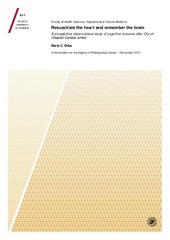Resuscitate the heart and remember the brain. A prospective observational study of cognitive outcome after Out-of-Hospital Cardiac arrest
Permanent link
https://hdl.handle.net/10037/9568View/
Thesis introduction (PDF)
Paper I: Ørbo M., Aslaksen P. M., Larsby, K., Norli, L., Schäfer, C., Tande, P. M., Vangberg, T.R., Anke, A.: «Determinants of cognitive outcome in survivors of out-of-hospital cardiac arrest.” Also available in Resuscitation 2014, 85(11):1462-8. (PDF)
Paper II: Ørbo, M, Aslaksen, P. M., Larsby, K., Schäfer, C., Tande, P. M., Vangberg, T. R., Anke, A.: "Relevance of cognition to health related quality of life after survival from out-of-hospital cardiac arrest." Also available in Journal of Rehabilitation Medicine 2015, 47: 860–866. (PDF)
Date
2016-06-03Type
Doctoral thesisDoktorgradsavhandling
Author
Ørbo, Marte ChristineAbstract
Cognitive outcome after out-of-hospital cardiac arrest
Aim: To investigate long-term cognitive outcomes after survival from Out-of-Hospital Cardiac Arrest (OHCA) with neuropsychological assessment methods. Background: OHCA may cause cognitive impairments and functional disability due to hypoxic-ischemic brain injury. Methods: Cognitive functions, health-related quality of life and affective symptoms were assessed at 3 and 12 months after resuscitation. Forty-eight survivors were prospectively included according to favorable outcome characteristics. Main results: At 3 months assessment cognitive tests for memory-, executive- and psychomotor functions were significantly impaired compared to normative population data. Longer coma duration was associated with poorer cognitive outcomes. Poorer cognitive outcomes was associated with worse reports of health-related quality of life. Few survivors reported symptoms of anxiety or depression. Minor changes in outcome measures were detected from 3 to 12 months. Less than half had cognitive impairments. Cognitive impairments were most often mild. Conclusions: OHCA survival is compatible with return to premorbid functioning and good health-related quality of life. However, cognitive functions should be assessed systematically after resuscitation to target the survivors that are in need of further rehabilitation interventions.
Description
Paper III of this thesis is not available in Munin.
Paper III: Ørbo, M, Aslaksen, P. M., Larsby, K., Schäfer, C., Tande, P. M., Anke, A.: «Does cognitive outcome change from 3-12 months in survivors from out-of-hospital cardiac arrest?" (Manuscript).
Paper III: Ørbo, M, Aslaksen, P. M., Larsby, K., Schäfer, C., Tande, P. M., Anke, A.: «Does cognitive outcome change from 3-12 months in survivors from out-of-hospital cardiac arrest?" (Manuscript).
Publisher
UiT The Arctic University of NorwayUiT Norges arktiske universitet
Metadata
Show full item recordCollections
Copyright 2016 The Author(s)
The following license file are associated with this item:


 English
English norsk
norsk
